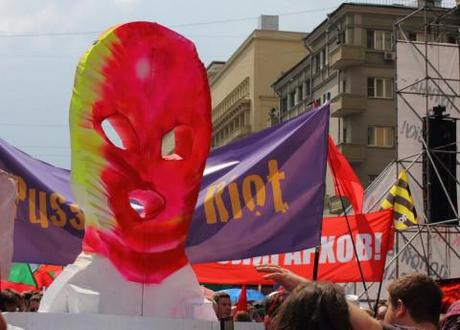 Protest in Moscow in support of Pussy Riot, June 2012.
Protest in Moscow in support of Pussy Riot, June 2012.
The background
Three members of Russian punk protest bank Pussy Riot are on trial for ‘hooliganism’ in Moscow. Nadezhda Tolokonnikova, Maria Alyokhina and Yekaterina Samutsevich have been in custody since February 2012 after singing an anti-Putin protest song by the altar of the Russian capital’s main cathedral. The feminist group are known for their impromptu performances around Moscow, often with strong political messages, as well as their brightly coloured balaclavas and tights.
The Russian Orthodox Church branded the obscenity-laced performance “blasphemous”, reported the BBC. But some commentators argued that the case has little to do with religious offense. Russia has seen a wave of protests after claims of rigged parliamentary elections in 2011 and anger that Vladimir Putin returned to the presidency in 2012 after a stint as prime minister. Is the Pussy Riot trial a case of state repression?
Pussy Riot trial ‘beginning of the end’ for Putin?
This is a “show trial” aimed at cracking down on dissent, said a Guardian editorial; but all Putin has achieved is to demonstrate how out of touch he has become: “Putin’s undoing is that while Russia has changed, he has not; worst still, he resists the future.” Putin may be secure in power at the moment, but if he continues on this path, he risks pushing protest into the mainstream: “It would be deeply ironic if the actions of a group of bright, articulate young women were to signal the beginning of the end for the world’s most macho political leaders.”
The Pussy Riot trial has led to protests in Moscow and St Petersburg, including a woman who ‘crucified’ herself outside a St Petersburg Church and a Russian artist who sewed his mouth shut, reported Russia Today.
Freedom of speech or offensive demonstrations?
“You have to bear in mind that in most countries, people can’t just go into a cathedral unannounced and perform a rock song while jumping around on the altar. That might well land you in court in New York City, too,” said an Economist blog. Admittedly, the treatment of Pussy Riot – five months in pre-trial detention and a potential seven-year sentence – would not happen in most countries. “But your free-speech rights don’t extend to aggressive, possibly offensive political demonstrations on someone else’s property without their consent.”
Punishment is too harsh for protest
“Certainly, Russians are entitled to be offended or delighted by the cathedral antics,” said a Washington Post editorial. “A brief arrest or citation might have been appropriate for the stunt, but months or years behind bars is grossly excessive.” It’s clear that Putin simply wants to “make an example” out of the three.
What is ‘hooliganism’?
Madeleine Kruhly provided a history of the legal charge of ‘hooliganism’ in Russia, from Tsarist days to the current trial, at The Atlantic. “Although the hooliganism of today and of Tsarist Russia might diverge in locality and origin, they still could both be said to represent a form of public protest against tyrannical authority and unjust rule,” Kruhly wrote. “And, once again, the powers of Russia seem to see an act of public dissent as something to be punished.”
See footage of the Pussy Riot cathedral invasion, in which they call on the Virgin Mary to “chase Putin out”.

